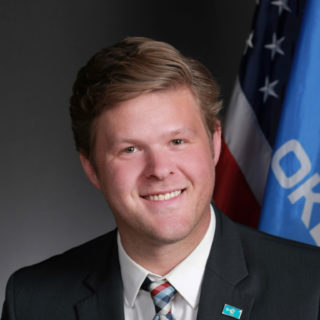Candidate Details
OK House District: HD 92
Party Affiliation: Democrat
Website:
Email:
forrest.bennett@okhouse.gov
Phone:
4055577404
Facebook:
Biography
This candidate does not have a Republican opponent and will therefore serve as the next Representative for this district.
As the current representative for House District 92, Forrest has fought alongside constituents, teachers, students, parents, local business owners and working Oklahomans to ensure they have a voice at the Capitol. As a fifth generation Oklahoman, Forrest is running for re-election to ensure that Oklahoma continues improving and continues to be a place where we want to live, work, and raise a family. Forrest began his professional career working with the legislature and knows firsthand the difference one person can make at the Capitol. After working to increase parent involvement and advocating for Oklahoma City Public Schools, Forrest chose to dedicate his time to the classroom, teaching American Government at OU.
Forrest is active in multiple community organizations, a board member for Thrive, Dale Rogers Training Center and Next Generation and an avid user and advocate for public transit. You can find him grabbing coffee at Elemental or Clarity Coffee in Downtown, eating lunch at Grill on the Hill or with Meg, walking their two dogs on the newly-added sidewalks on the Southside.
Platform Issues
Criminal Justice Reform
Throughout the 2016 campaign and Forrest's first session, hundreds of constituents reached out about meaningful criminal justice reform. In November, the voters said yes to meaningful criminal justice reform. This is reform that actually makes us safer, lowers prison costs, keeps families together and helps low-level offenders with substance abuse or mental health issues get the help they need to be productive members of society. While Oklahoma’s voters took big steps toward criminal justice reform with passage of SQ780 and 781 in 2016, there’s still plenty to do. When our prisons are at 120% capacity and they’re understaffed, there’s a big problem. Mental illness and addiction are leading causes of incarceration. If we can invest more in mental health and substance abuse, we’ll be able to save millions in tax dollars. After all, it costs Oklahoma around $5,000 to rehabilitate a person and over $20,000 a year to keep them in prison. Smart criminal justice reform will mean a safer and more prosperous Oklahoma for everyone. Keeping families together keeps communities strong, and too many low-level offenders are locked away for years instead of being rehabilitated, leaving families broken. Our prisons are overcrowded and underfunded. It’s time, as they say, to “lock up the folks we’re scared of, not the ones we’re mad at.
Education
Our children are our future. Oklahoma children must graduate ready to compete with graduates from others states like Texas, but also internationally, with graduates from countries like China and India. In order for our children to be successful in life, and to ensure that our economy thrives, we must make sure that every Oklahoma child has access to a quality education. That means making sure that class sizes are small enough to allow teachers time to give each student the individualized attention he or she needs to learn. It also means raising teacher pay to a level that is competitive not only with other states in our region, but the entire country. Too many teachers are working two or three jobs just to live. We shouldn’t be okay with that. It’s time to prioritize our children and our teachers. We've seen through actions at the Capitol in 2018 that there's an enormous amount of work left to do to restore our education funding to previous year's levels while remaining competitive in our region. This session, the Oklahoma House did something both historic and remarkable. We overcame the 75% threshold to raise taxes for the first time since that rule was enacted. We did it in order to raise revenue to give teachers and state employees a much-needed raise. In fact, it’s the biggest teacher raise in state history. That’s historic. What’s remarkable about it is that, despite how historic it is, it’s not enough. It’s a great start. It’s a compromise. It’s a step in the right direction. It’s equitable. It asks wealthy corporations and individuals to pay their fair share.
Healthcare
In a country that boasts the best healthcare in the world, too many Oklahomans don’t have the resources to access quality, affordable coverage. With healthcare costs soaring, we can do more to protect those who get sick or hurt and, through no fault of their own, can’t access care. Through our great system of community health clinics and hospitals, Oklahoma’s healthcare providers take care of people regardless of their ability to pay. But for those who are under-insured or uninsured, a simple illness or accident can become quite costly. Where we can regulate unnecessarily high healthcare costs to protect consumers, we should. Where we can fund health clinics and hospitals in preventative care, we should. Doing these things ensures that more Oklahomans can access quality healthcare, and that taxpayers aren’t overburdened by the cost of uncompensated care for those who aren’t covered.
Poverty
Keeping Oklahoma’s families from falling into poverty is a moral and economic imperative. A quality education, access to healthcare, and smart criminal justice measures go a long way in preventing poverty. But we can do even more. Restoring the rights of workers to earn a living wage, and protect their earnings against wage theft, is an important step in strengthening and supporting families in Oklahoma. Our tax base relies heavily on the working class Oklahomans to fund core government services. In fact, the poorest Oklahomans are paying over twice as much of their paycheck in taxes as the wealthiest. This isn’t fair or sustainable. If we can invest more in education, we will spend less on prisons. If we invest more in access to healthcare, we’ll spend less on disease and addiction. With a tax base that’s fair and equitable, more people will find prosperity.

